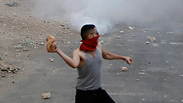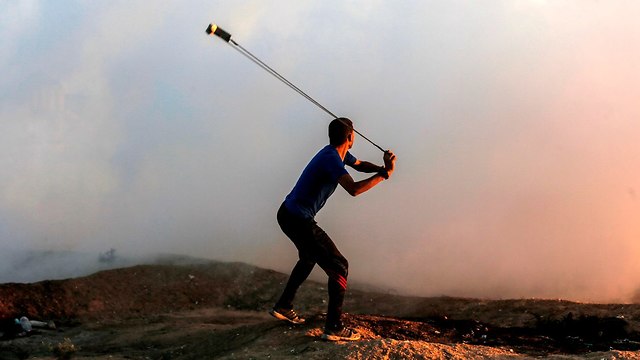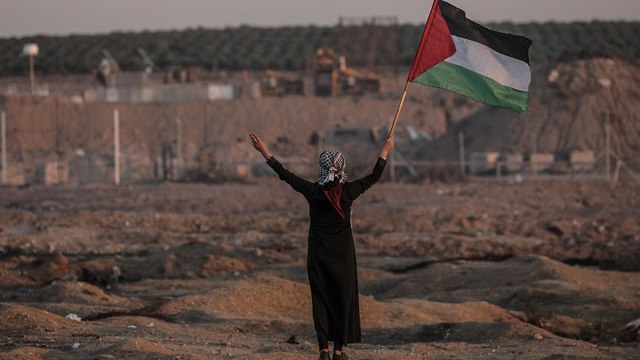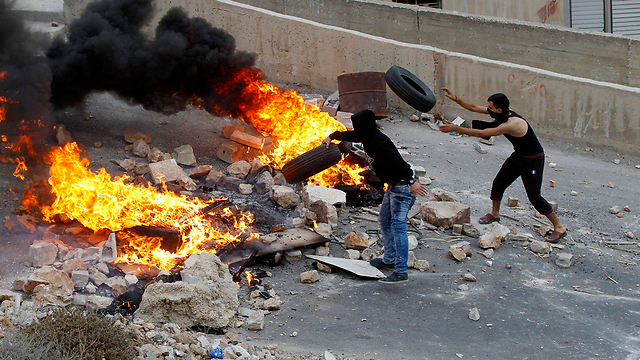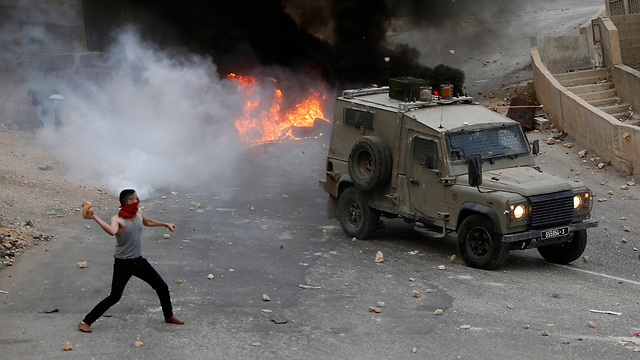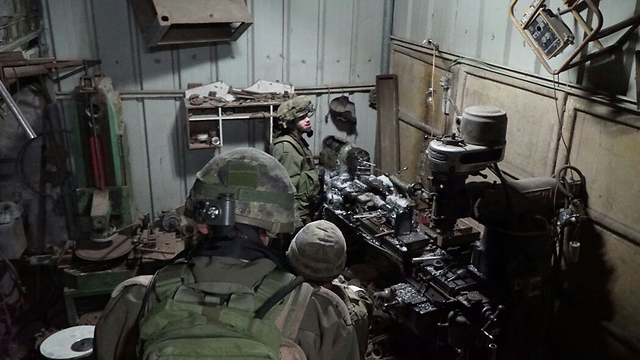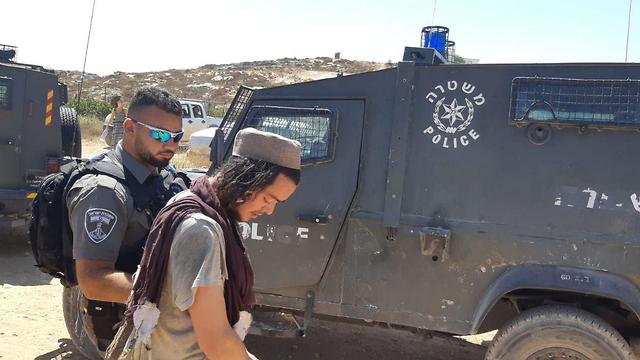
Calm in Gaza, unrest in the West Bank
Analysis: While the Qatari money arrived in Gaza and helped calm tensions, the West Bank sees almost monthly terror attacks or attempted attacks that undermine the quiet in the area. To prevent a flare-up in the territories, the IDF must send troops trained to handle clashes, while at the same time ensure Palestinian daily lives are not disrupted.
Speaking at a Knesset discussion several months ago, IDF Chief of Staff Lt. Gen. Gadi Eisenkot warned there is high probability for escalation in the West Bank. Shin Bet Director Nadav Argaman made a similar warning last week, saying the relative calm in the West Bank is "deceptive," as "Hamas is trying very hard to carry out terror attacks in and from Judea and Samaria."
Eisenkot's warnings seemed a bit exaggerated, especially in light of the fact there has been a drop in terror attacks in the West Bank over the first six months of 2018, despite President Donald Trump's decision to move the US Embassy to Jerusalem and other events with the potential to cause a flare-up.
Commentators invested a lot of time and effort in explaining why Gaza is going up in flames, while the Palestinians in the West Bank are demonstrating indifference. Now the tables have turned—it appears Gaza is calming down, whereas the shooting and stabbing attacks in the West Bank are becoming more commonplace.
The reasons for the apparent lull in Gaza are obvious: Hamas is slowly achieving the economic benefits it desires, and is attributing those successes to the "March of Return" campaign and the intense kite and balloon terrorism.
The persistent Egyptian mediation and the possibility of a ceasefire agreement between Israel and Hamas are helping too, and last week the London-based Al Hayat reported that Egyptian President Abdel Fattah al-Sisi had managed to convince Palestinian Authority President Mahmoud Abbas to accept the ceasefire understandings reached between Hamas and Israel.
Abbas's approval means he will pay at least part of the government workers' salaries in Gaza, and mostly that he won't continue tightening the noose around Gazans' necks in an attempt to cause a Palestinian uprising against Hamas.
Gaza's residents, who were on the verge of a catastrophic humanitarian crisis, did not rebel against Hamas, leading Abbas to understand his plan would not succeed anytime soon, and that he is no longer able to fend off the pressure from Egypt, Israel, and Europe.
It is impossible to know with the fickle Abbas, but at the moment it appears he will cooperate in the efforts to achieve calm in Gaza, maybe because he understands the volatile situation in the strip is spilling over into the West Bank.
Defense officials, who have been warning of possible escalation in the West Bank, estimate that the most dangerous option at the moment is mass rioting accompanied by shooting and stabbing attacks, which could erupt over a random incident.
Such mass rioting might lead to casualties and fatalities on both sides, and will require extensive military and intelligence efforts to restore calm. Hence, it is important to understand what is causing the current outburst of violence in the West Bank, 90 percent of which is not getting media coverage, while the other 10 percent are only the tip of the iceberg.
Despair, Khan al-Ahmar and Hamas incitement
The Shin Bet director told the Knesset's Foreign Affairs and Defense Committee that over the past year, security forces have thwarted 480 terror attacks, including 219 Hamas cells and 590 lone attackers.
The great majority of these efforts were done quietly, thanks to the monitoring of social media and classic thwarting efforts that prevented the lone attackers and the cells from getting to the point where they were on the verge of carrying out the attack. But the sheer number of them indicates the volcano in the West Bank is close to erupting.
The main reason for the unrest is probably despair and the lack of hope young people feel over the freeze in social, economic and diplomatic processes across the West Bank. The economic situation is of course much better than in the Gaza Strip, but the unemployment rate is still in the two digits range, while the diplomatic process is nonexistent due to the rift with the United States. The overall situation, which was not good to begin with, has gotten worse in light of the Trump administration's cuts in aid money to the Palestinian Authority and to UNRWA (the Palestinian refugee aid organization).
Other reasons for unrest include the dead and wounded on the Gaza border, and mostly Hamas's incitement and the terror group's attempts to launch murderous attacks in the area, to make up for what it can't do in the Gaza Strip. Hamas is using all of the channels at its disposal from Gaza, Lebanon and Turkey to send money and instructions as well as encourage dissent on the ground in the West Bank. Most of the work is done by former Palestinian prisoners released in the Shalit deal.
All of this helps inflame passions and encourage popular terrorism in the West Bank, as do the events in Khan al-Ahmar, the anger over the sale of lands to Jews in Jerusalem, the death of the Palestinian woman whose car was allegedly hit with stones thrown by Jewish settlers, and the endless clashes over the olive harvest.
When these things don't cause bloodshed, they're not reported in the media. But the Palestinians in the West Bank and the settlers know all about these incidents, and this creates an accumulation of anger and hatred that is looking for a way out.
Recently, almost every month saw three stabbing attacks or attempted stabbing attacks that point to the link between the accumulating nationalistic anger and the personal motives that eventually lead to a drawn knife or a vehicular attack, not to mention the dozens of cases of stone- and Molotov cocktail-throwing. Abbas's inciting and provocative speeches against Israel, the US, Hamas and almost the entire world also create a bad climate.
Abbas is not very popular, and he has probably lost the trust of the young Palestinian generation long ago, but the bad climate he creates still seeps into the ranks of Fatah and into Palestinian politics, and from there onto the Palestinian street.
In addition, the terror attack at the Barkan industrial area—in which Kim Levengrond Yehezkel and Ziv Hagbi were murdered—serves as an inspiration and encouragement among young Palestinians. This attack is considered a success not just because of the murder of two Jews, but also in light of the fact the terrorist remains at large, armed with the weapon he used to murder the victims.
It's important to understand all of these reasons. There is no one reason that, if handled, can settle the unrest. There's an accumulation of reasons that cause rage and anger among the hopeless young Palestinians, who want to do something to vent their anger. At some point, the Shin Bet might miss a would-be assailant, who will then go out and commit a terror attack.
Shin Bet and Palestinian security forces curb violence
There are some elements that curb the violence on the Palestinian street: The Shin Bet's effective thwarting of attacks and the activity of the Palestinian security services. Without these two, we would've long been in the midst of a third and perhaps even a fourth intifada.
But just as important in curbing the violence is the understanding among the Palestinian public—as a result of lessons learned from the second intifada—that a large-scale escalation could exact a steep price from the Palestinians in both casualties and economic damages. Defense officials believe this is the main curbing factor that is not the result of active efforts to thwart attacks.
It's important to note that the hostility and lack of trust toward Abbas on the Palestinian street also creates the feeling that there is no purpose to a popular rising the likes of which Abbas is pushing for.
And finally, the lack of a religious reason is important in curbing the violence, just as the introduction of a religious reason could be the spark that lights up the biggest escalation. But right now this hasn't happened. At least so far.
How to prevent escalation
The current unrest could lead people to go out and carry terror attacks, and so we can and should prevent this. Experience teaches us that the most important and effective measure is the reinforcement of IDF troops in the West Bank and their open presence on the ground, to allow them to quickly respond to every incident. It's important to make sure, however, that the reinforcement troops are well briefed and trained for clashes and are equipped with crowd dispersal measures.
In addition to the reinforcements, which in the current situation could be gradually deployed, the IDF must ensure the daily lives of the Palestinians who are not involved in terror activities are allowed to continue uninterrupted.
These two steps—reinforcing the troops while not disrupting the daily lives of the Palestinians—have proven to be the most effective measures of control and prevention of large-scale escalation.
Another important step that should be taken is curbing the Jewish outlaws. The Hilltop Youth harass the residents of the Palestinian villages on an almost daily basis, and thus raise the level of friction, tensions and anger on the ground. Curbing the Jewish outlaws by the Shin Bet and the police, and particularly by the settler leaders, is vitally important in preventing escalation.
The public, meanwhile, must remain alert and take precautions. Jewish parents picking up their children from after school activities and social activities in the West Bank must avoid doing so late at night. Every Jewish resident of the West Bank knows exactly what he must avoid and when.
Finally, launching diplomatic negotiations or any kind of discourse between the Israeli government and the Palestinian Authority—over economic projects and investment in the territories, for example—will undoubtedly contribute to calming the tensions as well. It won't bring to a solution, but it could contribute to calm, at least temporarily.
It's important to remember in this context that the Trump administration will presumably release its "deal of the century" peace plan in the coming months. It's unclear what this plan entails, but its very release has an explosive potential, and we must prepare for the possibility it will indeed lead to a flare-up.
The West Bank is like a minefield one must avoid entering. But if you're already inside, take every precaution to minimize the damage.













